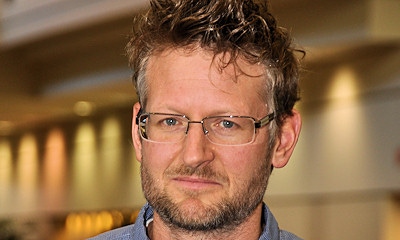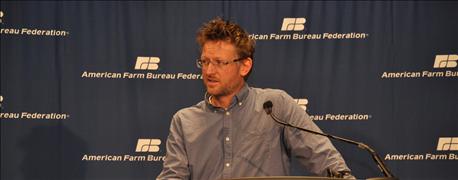
Once upon a time in the not-so-distant past, Mark Lynas would crawl through mud, clandestinely seeking to destroy European GMO crops.
“Machetes and all that,” he added in his British accent. Lynas, a world-renowned environmental scientist, bought into the dogma that GMOs were bad for the environment, calling herbicide resistance – the first GMO he learned of – the “original sin of the environmental movement.”
“It was the perfect storm: Monsanto plus RoundUp plus herbicide resistance, plus this unnatural occurrence of genetic engineering,” Lynas described.
The scientist made worldwide headlines three years ago when he reversed his anti-GMO stance.

Environmental scientist Mark Lynas said, "The experience of Chipotle has shown us that removing GMOs doesn't make the food any safer. They should've removed the e. coli, too."
“As a scientist, you must have data to back up what you’re saying,” Lynas said. “And I realized I wasn’t holding myself to the same scientific standards on GMOs as I applied to my research on climate change. You can’t pick and choose where you use science to back up your argument: You have to be consistent.”
It also dawned on him that there are other types of GMOs.
Related: A change of heart: Former anti-GMO advocate apology
Part of his pitch to farmers at the 97th annual American Farm Bureau Federation convention in Orlando this week was to assert the need for more advances in technology, adding that GMOs are critical to increased yields, food supply and food costs. Indeed, Lynas is now working with Cornell University to help develop GM crops that will help farmers in developing countries grow better crops without pesticides.
Value pitch
And in answer to the question of how to convince consumers GMOs are valuable? It’s not so hard, in theory, Lynas said: “You educate people on the value of something by giving them the information on why it’s valuable.”
That’s where mandatory labels could help, he argued. Because they’ve fought a GMO label, the food industry has a reputation for being against transparency. “Why would that increase anyone’s trust?” Lynas asked. “When you give people a sense of trust, they feel it’s less risky.”
People tend to feel something is risky when the benefits appear to accrue for a corporation instead of them, he explained, adding that you have to give them the understanding that there’s a choice.
“That’s why I support mandatory labeling,” Lynas said. Any single company that voluntarily labels GMOs can be targeted by activists. But if everyone labels everything?
“They have nothing else to fight,” Lynas said. “They say they are for choice and if consumers have a choice, activists can’t fight it.”
He pointed to the recent Campbells decision to voluntarily label GMOs across their entire product line. The company has operated the whatsinmyfood.com site for some time, where consumers could learn what’s in their chicken soup. They learned it contained GMOs and as Lynas described, “the sky didn’t fall in.”
In short, consumers had the information, didn’t panic, and have kept buying soup. “They put their whole corporate brand on the line for this,” Lynas added. “And it reduces the possibility that they can be demonized for having GMOs in their food.”
Which label?
Lynas believes the real issue is pesticides, not GMOs. A mandatory GMO label would be a political compromise, since there is no scientific support for it, but it still wouldn’t tell consumers what they want to know: how the food was raised.
“There’s a big difference in the farming system between Bt and herbicide tolerant,” Lynas explained. A QR code on the package would help consumers learn exactly what farming system was used and how the food was produced.
Even with clear scientific support, Lynas acknowledged, it’s difficult to convince the general public on biotechnology because of the scare tactics employed by activists. But he believes transparency can go a long way in building trust with consumers: “Transparency on GMOs will help dispel fears because people assume something is risky if they think information is being withheld from them,” Lynas said.
Related: Biotechnology, Amish and a Big Ol' Mea Culpa
But farmers can help. Lynas implored farmers to actively use social media, as the “only effective tool you have.”
Lynas added that most people don’t make the connection between crop protection and higher yields and lower food prices. “Huge numbers of people believe that farmers are just poisoning the land with chemicals because they want to, because that’s what the natural food industry has sold to them.”
He concluded, “Farmers are credible and trusted voices in the debate. You have direct grass roots experience of growing food. Why not tell about the challenges you face? Not just GMOs, but tell them about crop protection chemicals and why you use nitrogen fertilizers, and what happens if you don’t.”
About the Author(s)
You May Also Like






